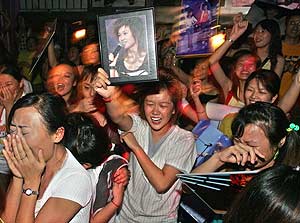 Screaming fans and SMS votelines are more popularly associated with the crazy Western nations who regularly run “Pop Idols” as it was first branded in the UK) and their spin off shows (such as “American Idol” and South African “Idols“). But now its China’s turn (see BBC report here).
Screaming fans and SMS votelines are more popularly associated with the crazy Western nations who regularly run “Pop Idols” as it was first branded in the UK) and their spin off shows (such as “American Idol” and South African “Idols“). But now its China’s turn (see BBC report here).
The frightening thing is the numbers. An online song by the Chinese favourite logged up one BILLION downloads from China, Singapore and Malaysia. More than 400 million people are estimated to have watched the final show live, with around 8m text votes being cast (SMS texting was the only way to cast your vote). OK, so that’s an impressive cultural phenomenon.
But, as the Economist reports, its more than just cultural. This is something bigger. You’ve just given a fair portion of the country a taste of democracy. And some of the Chinese media are making sure people understand this fact! Could it be that “Idols” will achieve what the USA and UN have not been able to?
Read the Economist’s brief report below.
From The Economist, September 10, 2005
http://www.economist.com/displaystory.cfm?story_id=4382469
Democracy Idol
A television show challenges the authorities
Reuters
CHINA is trying to digest the implications of a popular vote involving millions of people across the country. Never mind that the ballots were cast for contestants in a televised singing competition, and that only those with the means to send text messages by mobile phone could take part. A front-page headline last week in the state-run Beijing Today put the question with astonishing frankness: “Is Super Girl a Force for Democracy?�
In a country conspicuously lacking in democratic choice, this rare opportunity to vote and make a difference—even if only to the outcome of the “Mengniu Sour Yoghurt Super Voice Girl� competition—has inspired a remarkable debate. The discussion has been fuelled by huge public enthusiasm for the show, a programme similar to “American Idol� and its predecessor “Pop Idol� in Britain. It was broadcast by a satellite television station in Hunan province and relayed nationwide on cable networks. The organisers say some 400m people watched the final on August 27th—nearly a third of the population. Around 8m text message votes were cast.
“Super Girl�, as the show is commonly known, appealed mainly because of its racy format (at least until the authorities began insisting on more downbeat folksy songs) and the pleasure that many enjoy from watching amateur singers embarrass themselves. Rebellious young women apparently identified with the self-confident and boyish-looking winner, Li Yuchun. Groups of fans campaigned in the streets.
Some of China’s more daring newspapers have seized on the chance to put “Super Girlâ€? in a political context. An article widely carried on state media websites said the contest had caused Chinese intellectuals to “fantasise about arrangements for democratic elections and notice the awakening of democratic consciousness among the younger generation.â€? But the China Daily loyally expressed scepticism, asking, “How come an imitation of a democratic system ends up selecting the singer who has the least ability to carry a tune?â€? That, of course, is democracy.


